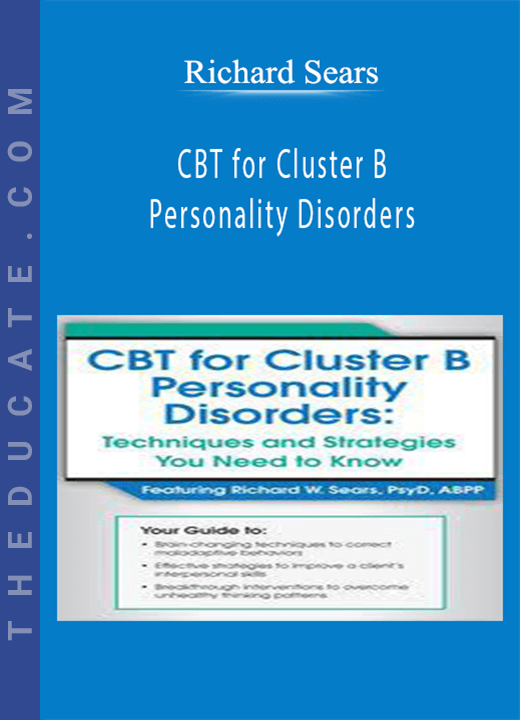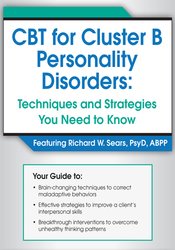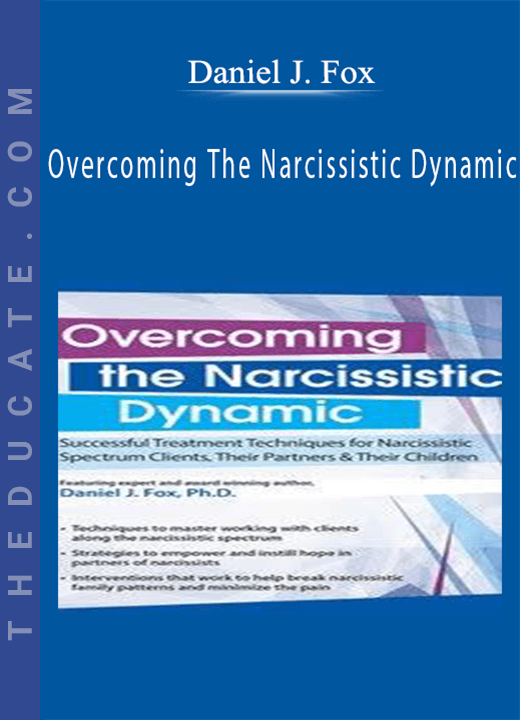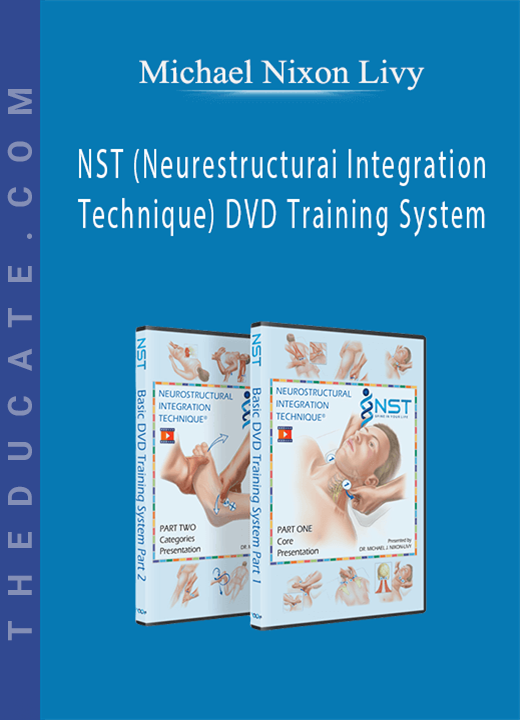Description
-
Richard Sears – CBT for Cluster B Personality Disorders: Techniques and Strategies You Need to Know
- Faculty:
- Richard Sears
- Duration:
- 3 Hours 3 Minutes
- Format:
- Audio and Video
- Copyright:
- Jul 18, 2019
Description
Clients with cluster B personality disorders (borderline, antisocial, histrionic, and narcissistic) can be amongst the most challenging for therapists. Clinicians who are not properly trained can inadvertently make clients worse, and can even put themselves at risk for licensure board complaints.
However, when equipped with a deeper understanding of these disorders and the most effective principles and techniques, it can be extremely rewarding to witness the positive ripple effects that occur in these clients and their families.
In this recording, join clinical psychologist and author Dr. Richard Sears for a compassionate yet direct approach for working with these individuals using cutting edge, practical interventions that are grounded in theory.
You’ll learn:
- How even the most frustrating, maladaptive behaviors get conditioned and reinforced over time (and what to do about it)
- How to recognize and interrupt unhealthy thinking patterns
- Strategies for breaking free of struggles with thoughts, feelings, and unhealthy behaviors
- Skills for managing stress, pointers for managing stressful sessions, etc.
- How to avoid getting “sucked in” or hooked into the drama, “crisis of the week”
- How to model presence with distress and emotional chaos
With solid principles and detailed case examples, Dr. Sears will bring these concepts and methods to life with passion and humor, giving you practical take-aways to use in your very next therapy session!
Handouts
| Manual – CBT for Cluster B Personality Disorders (2.1 MB) | 42 Pages | Available after Purchase |
Outline
What You Need to Know about Cluster B Diagnoses and Approaches
- Diagnostic criteria: borderline, antisocial, histrionic, narcissistic personality disorders
- Key features of each disorder – differential diagnosis considerations
- Top indicators of PD you won’t find in the DSM-5®
- 5 things you probably never knew about cluster B personality disorders
- How to avoid judgment and labeling and its importance
CBT Treatment Strategies and Techniques for Cluster B – Your Guide to Practical Application
Behavior – How to Approach Maladaptive Behavior, Self-Sabotage, Manipulation and Attention Seeking
- How to shift behaviors that have been conditioned over a lifetime
- Disrupting reinforcement
- 5 things you may be doing that actually reinforces maladaptive behavior
- Practical application of classical and operant conditioning concepts
- Roots of behavioral therapy
- Psychoeducation: Increase clients’ insight into how their behavior is reinforced
- Exposure techniques: Build distress tolerance and momentum toward healthier choices
- Chain analysis: How to address a client’s feelings of hopelessness, improve awareness and identify precipitating factors and choice points
- Case study – Sam, The Man Who Blames Everyone Else
Cognitive – How to Recognize and Interrupt Unhealthy Thinking Patterns
- How to address negative beliefs about treatment, the experience of negative emotion and getting better
- How to adapt cognitive techniques specifically for Cluster B
- ABC records and Challenging Beliefs Worksheets
- Socratic dialogue
- Common cognitive distortions
- Why challenging your client’s thoughts can make things worse
- Case study – Martha, The Woman Who Confused her Thoughts and Memories with Reality
Mindfulness and Acceptance – Break Free of Distressing Thoughts, Feelings and Behaviors
- How to increase psychological flexibility, decrease emotional intensity, and focus on the bigger picture
- Why mindfulness and relaxation are not the same thing
- Mistakes with mindfulness – inadvertently encouraging avoidance
- How to adapt mindfulness and acceptance techniques for Cluster B
- Cognitive defusion: Stepping back from thoughts
- Acceptance: Letting go of control
- Mindfulness: Foster the ability to stay present
- Observing the self: Develop a bigger sense of who you are
- Identify values: Finding the “why”
- Take committed action
- Case study – Arthur, the Loving, Self-Centered Father
Special Clinical Considerations for Personality Disorder Practitioners
- Crisis management: Suicidal ideation/gestures, self-injury
- Create a clear crisis management plan to keep clients safe and avoid personal liability
- What you need to avoid – documentation considerations and more
- 5 signs you need to check your boundaries
- Preventative measures – to avoid boundary violations and false reporting to licensure board
- Strategies for recognizing and addressing countertransference – being honest without getting lost
- Top 3 tips for staying present in session
- Balance boundaries with compassion
- Model presence with distress, not joining the emotional chaos
- Internal messages – Not getting sucked in
- Exercise: People that bother me
Faculty

Richard Sears, PsyD, PhD, MBA, ABPP Related seminars and products: 13
Director
Center for Clinical Mindfulness and Meditation
Richard Sears, PsyD, PhD, MBA, ABPP, is a licensed psychologist in Cincinnati, Ohio, board certified in clinical psychology by the American Board of Professional Psychology (ABPP), runs a private psychology and consultation practice, and is the Director of the Center for Clinical Mindfulness & Meditation. He is also clinical assistant professor at Wright State University School of Professional Psychology, clinical/research faculty at the UC Center for Integrative Health and Wellness, volunteer professor of Psychiatry & Behavioral Neurosciences at the UC College of Medicine, and a research/psychologist contractor with the Cincinnati VA Medical Center.
His most recent books include: Cognitive Behavioral Therapy & Mindfulness Toolbox (PESI, 2017); Mindfulness: Living Through Challenges and Enriching Your Life in this Moment (Wiley-Blackwell, 2014); Perspectives on Spirituality and Religion in Psychotherapy (PR Press, 2014); Building Competence in Mindfulness-Based Cognitive Therapy (Routledge, 2015); and Mindfulness-Based Cognitive Therapy for PTSD (Wiley-Blackwell, 2016). Dr. Sears is lead author of Mindfulness in Clinical Practice (PR Press, 2011) and Consultation Skills for Mental Health Professionals (Wiley, 2005).
Dr. Sears is a fifth-degree black belt in Ninjutsu, and once served as a personal protection agent for the Dalai Lama with his teacher, Stephen K. Hayes. He has studied the Eastern Wisdom traditions for over 30 years, receiving ordination in three traditions, and has been given transmission as a Zen master.
Speaker Disclosures:
Financial: Richard Sears holds faculty appointments at the University of Cincinnati. He receives a speaking honorarium from PESI, Inc.
Non-financial: Richard Sears is a diplomate of the American Board of Professional Psychology and is a fellow of the Academy of the American Board of Clinical Psychology.









12 reviews for Richard Sears – CBT for Cluster B Personality Disorders: Techniques and Strategies You Need to Know
There are no reviews yet.